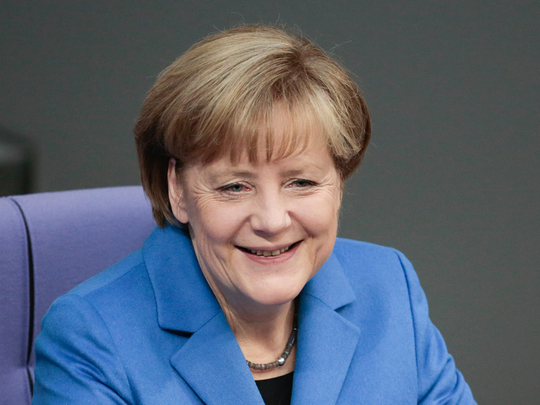
Germany is casting around for a foreign policy. To say Angela Merkel’s government has embraced the task with unbridled enthusiasm would be an overstatement. Twenty-five years after the fall of the Berlin Wall most Germans would still prefer to hide behind history. Selling cars and machine tools overseas is one thing; marking out an active role in a disordered world quite another. Russia’s march into Ukraine has robbed Merkel of the choice.
Ask diplomats who is managing the west’s response to Vladimir Putin’s revanchism and the answer is Merkel. It is not often you hear US officials volunteer that their president is playing second fiddle. But Barack Obama has other things on his mind — the Middle East’s descent into violent chaos, Ebola and China among them. And anyway Ukraine is in Europe’s backyard. So Merkel makes the calls to Moscow.
Life was simpler during the Cold War. The Bonn government set its foreign policy compass by two objectives: re-unification with the East and reconciliation in an integrated Europe. Helmut Kohl saw his mission as making a united Germany safe for Europe. The pursuit of this existential goal required nothing more complicated than a close relationship with Washington and an even closer partnership with Paris.
There were occasional bumps. Bonn fell out with the US over Willy Brandt’s overtures to Moscow, and with France over European economic management. But fealty to the Atlantic alliance and deference to Paris within the EU established the organising framework.
During the quarter of a century since the wall came down, successive governments have loosened somewhat the constitutional straitjacket that precludes German involvement in foreign wars. Berlin played a part in Kosovo and sent troops to Afghanistan. It has joined policing missions in Africa and anti-piracy operations in the Indian Ocean. Yet the political mindset in Berlin has remained passive. Gerhard Schroeder stood out against the Iraq war; his successor, Merkel, opposed intervention to oust Libya’s Muammar Gaddafi.
Putin’s annexation of Crimea and his incursions into eastern Ukraine have changed the rules of the geopolitical game. Moscow has upturned the organising assumption of post-war European security that national frontiers could never again be altered by military force. Geography and relative economic weight as much as the absence of US leadership dictate that Germany frames the West’s response.
Joachim Gauck, the German president, anticipated change when he spoke to this year’s Munich Security Conference. Germany had flourished in a world of international rules and norms. Now the system was under challenge: “I don’t believe that Germany can simply carry on as before.”
Unintended consequences of Russian aggression
Frank-Walter Steinmeier, the foreign minister, makes the same point as part of an exercise to update the national world view. Germany is too big and has too strong an economy “merely to observe world events from the sidelines”. In the hallowed consensual traditions of the federal republic, Steinmeier wants to nudge a sceptical public towards recognising a need for international engagement. Ministerial speeches have been accompanied by open town hall meetings. One of the unintended consequences of Russian aggression in Ukraine has been to help the process along. Even stalwarts of the old Moscow-leaning Ostpolitik struggle these days to make Putin’s case.
For her part, Merkel has earned some plaudits for her handling of EU sanctions against Russia. The chancellor was too slow and cautious at the outset, but has since shown a measure of resolve. Matteo Renzi, Italy’s prime minister, counts himself a politician of the left but he has been every bit as enthusiastic as Silvio Berlusconi in defending Italy’s close commercial relationship with Putin’s regime. Merkel has slapped him down.
Renzi is not alone in doffing his cap to Moscow. Hungary’s Viktor Orban is an unabashed admirer of the Russian president. On the other side of the table Poland and the Baltic states have understandably called for a tougher line against Moscow. History leaves an ever-present fear in Warsaw that Berlin will be tempted to do a deal with Moscow over the heads of its neighbours.
Yet for all the skilful diplomacy, there is something important missing both in Steinmeier’s careful canvassing of public opinion and Merkel’s effort to hold Europe together. It is a question of mindset as much as anything — the gap between the leadership calculated to set a course and an approach that simply channels the prevailing mood.
Of course, consensus helps but it is not a substitute for policy choices. The danger is that Europe’s response to Ukraine is driven by the lowest common denominator rather than a hard-headed effort to deter Putin. Moscow’s defiant blessing this week for sham elections in Russian-controlled eastern Ukraine points precisely to this danger.
Merkel has built her political career on caution — on taking the temperature and weighing all the options before acting. The approach has served her well. But leadership in foreign policy demands something more: an understanding that doing nothing can be more dangerous than doing something, and a readiness to step out in front of the crowd.
Consensus may be comforting; it does not impress the likes of Putin.
— Financial Times









